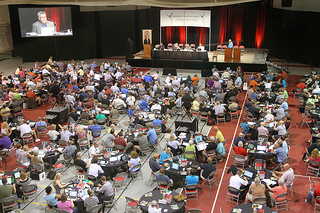 Jay Harsevoort/Flickr
Jay Harsevoort/FlickrThe Reformed Church in America (RCA) officially eliminated a policy allowing its members to object to the ordination of women this past week. While the church originally allowed members to conscientiously object to the ordination proceedings, the removal of the "conscience clauses" from the RCA's Book of Church Order means that clergy can no longer refuse to participate in a woman's ordination on the basis of her gender.
The RCA, which first began ordaining women in 1979, initially accommodated members' opposing views on women clergy by allowing that "If individual members of the classis find that their consciences, as illuminated by Scripture, would not permit them to participate in the licensure, ordination or installation of women as ministers of the Word, they shall not be required to participate in decisions or actions contrary to their consciences, but may not obstruct the classis in fulfilling its responsibility to arrange for the care, ordination, and installation of women candidates and ministers by means mutually agreed on by such women and the classis."
The change was originally proposed at the RCA's 2012 meeting after receiving results from a survey of women RCA ministers, according to the Christian Post. Christina Tazelaar, managing editor of the RCA magazine RCA Today, told the site that although the women surveyed had experienced more support for their ministry in recent years, "24 percent reported some obstacle or setback to their candidacy for ordination as a result of inappropriate use of the conscience clauses."
CT blogger Ed Stetzer spoke on missions at the 2013 meeting. In a blog post, he noted the denomination's theological diversity and relative membership success to other mainline denominations. He also noted that the RCA is also focused on growth and outreach initiatives such as "multiracial strategies, church revitalization, and church planting."
CT has extensively covered women's ordination and Christian perspectives on gender, including the Evangelical Presbyterian Church's decision to allow ordination of women and the way in which Christians on both sides of the debate discuss ministry roles.









